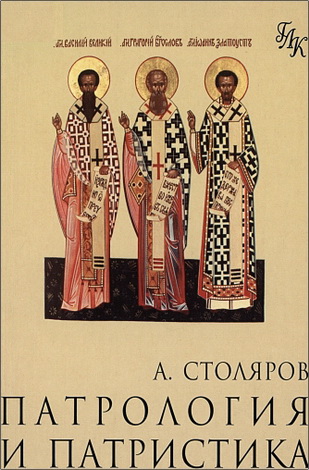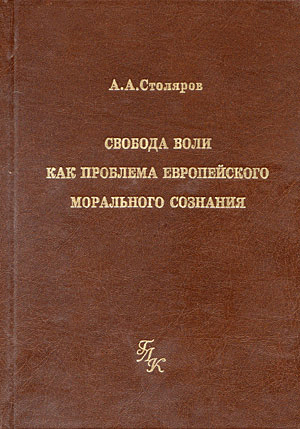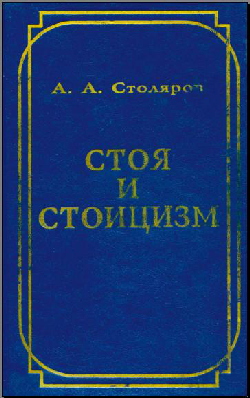|

|
Date and Place of Birth
Born October 12, 1953 in Moscow.
Education
Graduated from Lomonosov Moscow State University, Faculty of History, Department of Ancient History, in 1975.
Academic Degrees
- PhD in Philosophy (1983). PhD Thesis: «The Problem of the Freedom of the Will in Early Medieval Philosophy: Aurelius Augustinus» (Institute of Philosopy, The USSR Academy of Sciences).
- DSc in Philosophy (1997). DSc Thesis: «Philosophy of Stoic School: Main Problems of Genesis and Evolution» (Institute of Philosopy, Russian Academy of Sciences).
|
|
Career
|
- Leading Research Fellow at the Department of History of Western Philosophy.
|
|
Fields of research
|
- Ancient Philosophy;
- Stoicism;
- Early Christian Thought.
|
| Lectures |
History of Stoic School and its Doctrine
- Faculty of Philosophy, Moscow State University, 1993;
- Faculty of Philosophy, Russian State University for the Humanities, 1994–1995;
- Faculty of Theology, Russian Orthodox University, 1995.
Patristic Studies
- Faculty of Philosophy, State Academic University for the Humanities, 1996;
- Faculty of Philosophy, Russian State University for the Humanities, 1994–1995.
|
| Scientific Advising |
- A. Yu. Grishina, «Plutarch from Chaeronea as a source of Stoic Philosophy's reconstruction» (Ph.D. thesis).
|
| Educational Materials |
- Patrology and Patristics. A Short Introduction. Moscow: «GLK», 2004.
- «Patristics», in Nelly V. Motroshilova (ed.), «History of the West-European Philosophy. Handbook. Moscow: Institute of Philosophy, RAS, 1998. pp. 63–81.
- «Patristicts», in Nelly V. Motroshilova (ed.), «History of Philosophy: West-Russia-Eastern: Workbook in 4 Vol. Moscow: «GLK», 1995.
|
| List of publications |
BOOKS
|
|

|
- Gaius Musonius Rufus. The Fragments. Introduction, translation, and commentary by Alexander A. Stoliarov. Moscow, Institute of Philosophy Press, 2016. – 144 pages. – Paperback. – ISBN: 978-5-9540-0311-6 (in Russian)
This edition presents the first Russian translation of the full corpus (on the base of the Hense's edition) of Musonius Rufus, whose fragmentary texts are largely extracted from Stobaeus and also from a number of minor sources. Gaius Musonius Rufus was a Roman Stoic philosopher of the 1st century AD who, despite being a less-known figure, for his importance can be compared with Seneca, Hierocles, Epictetus (who was Musonius’ disciple) and Marcus Aurelius. He first engaged in the study of philosophy in Rome during Nero’s reign and, after being exiled in 65, came back to Rome after Galba’s ascent to power; at some time in the 70s he had to go to exile again, to be back only after the death of Vespasian. Like many other representatives of the Later Stoa, Musonius paid little attention to the theoretical side of the Stoic doctrine, concentrating mostly on practical ethics, namely, the so-called paraenetic, or moralistic discourse, a discipline which eventually exerted great influence of European moral philosophy. Musonius advises on how one should behave in a given situation, parting from the positive assumption that a human being is born with a proclivity for virtuous life and a capacity of goodness. The present book follows Musonius’ life and teaching through the events of Roman history and public life; as a result, one gets a more complete understanding of his character and thinking (and also of the reasons why it became influential), as well as of the common background of Roman, in particular Stoic, philosophy of the 1st century. A paradigmatic Roman intellectual, Musonius contributed to shaping that idea of a dignified way of life which dominated European consciousness ever since; his own example gave proof of his adherence to the principles he believed to be true.No cabinet philosopher, Musonius Rufus was a champion of education, marriage, equality of the sexes, and freedom of the individual. But especially he taught how to live a virtuous life in difficult circumstances. His methods included Socratic discussion, training exercises, and close association with students such as Epictetus and other well-known figures of the time. Above all he was a living example of what he taught. Based on the ancient texts and modern scholarship, this book is the first russian comprehensive treatment of Musonius Rufus, his life, teachings, and methods. It recounts his active life in dramatic times, describes his basic teachings and their application to practical problems of life, and systematically presents all aspects of his approach to philosophy, education and related items.
|
|

|
- Fragments of the Early Stoics: In 3 Vols. /Translation and commentaries by Alexander Stoliarov. Мoscow: Museum Graeco-Latinum Publ., 1998–2010. – Hardcover. (in Russian)
This edition presents the first full translation into Russian of Stoicorum veterum fragmenta – the classical coprs of early stoic texts, prepared by von Arnim. The present edition has two main goals: to intorduce the texts of early Stoics to russian audience and to elaborate the principles of translation of stoic terminology into Russian (on the base of experience that is provided by foreign and russian literature about Stoics). The edition is supplied with commentary and indexes.
- Vol. I. Zeno and his disciples. 1998. – 230 pages. – Hardcover. – ISBN: 978-5-87245-034-6.
- Vol. II, 1. Chrysippe of Soli. Logical and physical fragments. 1999. – 280 pages. – Hardcover. – ISBN: 978-5-87245-054-0.
- Vol. II, 2. Chrysippe of Soli. Physical fragments. 2002. – 260 pages. – Hardcover. – ISBN: 978-5-87245-091-5.
- Vol. III, 1. Chrysippe of Soli. Ethical fragments. 2007. – 300 pages. – Hardcover. – ISBN: 978-5-87245-136-5.
- Vol. III, 2. Chrysippe's disciples and successors. Indexes. 2010. – 267 pages. – Hardcover. – ISBN: 978-5-87245-166-2.
|
|

|
The purpose of this book is to introduce the reader to the basic concepts and problems associated with the study of patristics - the theoretical heritage of that most important period in the history of Christian spiritual culture, which occupies the first eight centuries of the new era. First of all, we are talking about the mutual relationship between the terms Patrolology and Patristics; The structure of the book, consisting of two sections, is based on the possible difference in their meanings. The first outlines the main stages in the history of Patrolology as a discipline that studies Patristics, examines its methodological and debatable problems, and provides information about the main literature of the subject. The second section is devoted to Patristics itself; here we are talking about the specific problems of religious philosophizing, about the main problems of periodization and classification of Patristics in connection with its stylistic features, and in conclusion, a concise outline of the history of the main stages of Patristics is offered.
|
|

|
- Freedom of the Will as a Problem of European Moral Concsiousness (Some Essays on History from Homer to Luther). Moscow: Museum Graeco-Latinum Publ., 1999. – Hardcover. (in Russian)
Freedom is one of the main intuitions of european culture since antique times. Therefore it is important to develop an understanding of the way freedom became a real problem of philosophical reflection – especially in its specific form, the freedom of the will. The latter in historic retrospective often appeared rather as «philosophical metaphor» than as strict notion. But in spite of this there exists a coherent set of key problems, such as: what is moral action? does imputation of action require moral autonomy? and the like. The book tries to reconstruct the basic types of european moral consciousness and different aspects of evolution of «voluntaristic» terminology.
|
|

|
The monograph is devoted to the history of the Stoic school and its teachings (from its emergence at the turn of the 4th–3rd centuries BC until its disappearance at the end of the 2nd century AD), as well as the history of Stoicism. The author calls the school doctrine in the form in which it existed during the indicated period the teaching of the Stoa in the proper sense. The pages of the book present all the notable Stoic philosophers, the most important terms and essential points of Stoic teaching. Stoicism is a broader concept. By it, the author understands a unique style of reflection on the content of Stoic dogmas that has developed over the course of one and a half thousand years and, predominantly, a style of practical moral instructions.
|
| |
ARTICLES
|
|
|
2023
- Apathy // Philosophical anthropology. 2023. Vol. 9 No. 1. pp. 177–190. (in Russian)
2020
Zeno from Citium in Cyprus (ca 333/4‒262/1 BC), of Phoenician origin, founder of the Stoic school. Ca 300 BC he started teaching at Athens at s.c. Painted Stoa (a gallery on the Athenian Agora); after it was named the Stoic school. Zeno experienced the influence of academicians (division of philosophy in three parts), megarians (logic), Aristoteles and possibly Heraclites (physics), cynics and Socrates (ethics). Having this as a basis he developed his special doctrine. Three parts of philosophy are inseparably connected. Logic investigates the principles and the limits of knowledge. Physics located at the middle place formulates the laws of the universe and thereby installs the basis of ethics. Ethics as the crown of the teaching proves the final end of the rational being: life in accordance with nature, that is with the prescriptions of the cosmic logos, corresponds to happiness.
- Chrysippus of Soli // Philosophical anthropology. 2020. Vol. 6. No. 2. pp. 127-156. (in Russian)
Chrysippus of Soli (c. 280/77‒208/5 BC) was a most multilateral stoic philosopher; he earned the title of Second Founder of Stoa. A prolific writer (he has written much more than any other stoic philosopher, but none of his works have survived except as fragments), Chrysippus expanded the fundamental doctrines of Zeno of Citium, the founder of the school. Chrysippus excelled in logic, the theory of knowledge, physics and ethics. He created an original system of propositional logic in order to better understand the causal interrelations of events in the universe. He adhered to a deterministic view of fate, but nevertheless sought a role for personal freedom in thought and action. Ethics, he thought, depended on understanding the nature of the universe, and he taught a therapy of extirpating the passions which depress the soul. He initiated the success of Stoicism as one of the most influential philosophical movements in the Greek and Roman world.
2018
This article provides the vision of the “jewish question” in so far as the latter can be illustrated by the opinions of ancient philosophers and authors with semi-philosophical interests. The article rests upon the collections of texts supplied by T.Reinach and M.Stern, the starting point being one of the first works of S.Luria, the prominent Russian researcher of antiquity. Up to my mind, there existed no consistent and centralized antisemitic policy in antiquity. Far from being homogenous, the attitude of ancient philosophical and semi-philosophical socium towards jews and Judaism compared with that of other ancient intellectuals appears, however, to be marked in its positive aspect by a higher level of reflexion and by intention to find out productive elements in judaism and in monotheistic paradigm. Such attitude is peculiar to many adherents of platonic and pythagoreic tradition, particularly to Numenius; from the historic-philosophical and from historic-cultural points of view it appears to be more perceptive and decidedly tolerant.
The article is dedicated to Gaius Musonius Rufus, a Roman Stoic philosopher of the 1st century. AD, a representative of the Late Stoa, who focused on practical ethics, or moralism, and proceeded from the positive assumption that man is endowed with the capacity for good. A typical Roman intellectual, Musonius contributed to the formation of the image of a dignified life that dominated European moral consciousness over the following centuries, and confirmed his loyalty to his principles by personal example.
2016
- Alexander Stoliarov: «I’ll be perfectly honest with you». Prof. A. Stoliarov interviewed by Olga Kusenko // History of Philosophy Yearbook [Istoriko-Filosofskii ezhegodnik]. 2016. pp. 228–248. DOI: 10.21267/AQUILO.2018.2017.9382 (In Russian)
This conversation with Alexander Arnoldovich Stoliarov ‒ an eminent scholar, the leading expert in the Stoic philosophy and Patristic tradition ‒ took place in the summer 2017 as a part of RAS Institute of Philosophy project “Pages of History”. In the interview Prof. Stoliarov talks about his student years in Lomonosov Moscow State University, the faculty of history and its professors, the department of Ancient History, bookstores and samizdat, perception of classical music, “Okhotnik” [Hunter] cafe menu, a tour to Solovki, his working as a secretary in A.F. Losevʼs (an outstanding Russian philosopher of the 20th century) home-office, the “blank spot” in Stoicism, his thesis defense, Volkhonka 14, weird soviet “traditions”, friends of his youth, colleagues and many other things. People and situations mentioned here comprise the collective intellectual biography of the 1970s‒1980s generation of young Soviet scholars and introduce the reader to this interesting period of the Soviet history. Interview conducted by Olga Kusenko.
2015
Gaius Musonius Rufus - Roman Stoic philosopher of the 1st century. n. e., little known to the domestic audience, but standing on a par with Seneca, Hierocles, Epictetus (a student of Musonius) and Marcus Aurelius. Having begun his studies in philosophy in Rome during the reign of Nero, in 65 AD. e. he was expelled, returned to Rome after Galba came to power; in the 70s he was expelled again and returned after the death of Vespasian. Like other representatives of the Late Stoa, Musonius focused not on the theoretical aspects of the Stoic doctrine, but on practical ethics - the so-called parenetics, or moralism, which had a great influence on European moral philosophizing. Musonius advises how to behave in specific life situations, and proceeds from the positive assumption that a person is endowed with a disposition to live a virtuous life and a capacity for goodness. The purpose of this article is to consider the life and teachings of Musonius in the context of events in Roman history and social life: this allows us to get a more complete picture of both the personality and ideas of Musonius (as well as the reasons for their influence), and the historical and cultural background of Roman and, in in particular, Stoic philosophizing of the 1st century. AD A typical Roman intellectual, Musonius contributed to the formation of the image of a dignified life that dominated European consciousness at almost all times, and by personal example confirmed his devotion to the principles that he considered true.
2014
The anthropological problems of European philosophy have maintained a certain degree of invariance over thousands of years. A comparison of the anthropological positions of Chrysippus, the largest author of the Early Stoa, and Posidonius, the leading representative of the Middle Stoa (as presented by one of the greatest ancient physicians, Galen) shows that the questions that worried them about the essence of man and his mental structure are quite relevant for our time. But we must make important adjustments to the specifics of thought patterns, problematic agendas and the intellectual climate of those times, and also take into account the incommensurability of the “mass” of philosophical developments that existed then and accumulated today. This will allow us to better understand the continuity between ancient and modern philosophical thought, as well as the connection between anthropological, psychological and ethical problems. It is suggested that both Chrysippus and Posidonius wanted (each within the framework of their understanding) to harmoniously correlate the “integral” (according to their concepts) individual with the universe and endow this individual with such a set of abilities that would allow him to withstand life’s adversities. A significant part of the cited texts, which clearly demonstrate the nuances of anthropological reflection in antiquity, are brought to the attention of the domestic reader for the first time.
2013
For quite a long time, Posidonius was a mysterious and “fashionable” figure for historians of ancient philosophy. He was considered the forerunner of the “great synthesis”, which prepared the birth of Neoplatonism (through middle Platonism). However, upon closer examination, Posidonius's basic texts relating to physics indicate that he was a completely canonical Stoic and could hardly have played such a key role in the Neoplatonic synthesis as was attributed to him.
2012
- Scholarly Philosophy of Late Antiquity and the Christian Teaching: Some Reflections Concerning the Interference of Ideas // History of Philosophy Yearbook'2011 / Institute of Philosophy, RAS. Moscow, 2012. pp. 101–170. (in Russian)
The influence of ancient philosophy on patristic is obvious. But since long there exists an opinion that Christianity also had influence upon some pagan philosophers of late antiquity, especially on Hierocles of Alexandria and on Ammonios, the teacher of Plotinus. However the teaching of Ammonios defies any reconstruction. All attempts to seek direct Christian influence on Hierocles in the sphere of fundamental notions about the structure of being and the arrangement of the world can only lead to erroneous conclusions. If it is possible at all to speak about Christian influence upon pagan philosophy – namely upon later Neoplatonists – its traces are most likely to be found in the areas marginal for the pagan consciousness. As a possible example we can consider neoplatonic triads similar to the evangelic triad «faith–hope–love».
2011
- On Forthcoming Edition of the Fragments of Posidonius // Philosophical Journal. 2011. № 1 (6). P. 31–53. (in Russian)
This is the first part of the forthcoming publication of the first Russian translation of the fragments of Posidonius, the foremost representative of the Middle Stoa, containing the testimonies of his life and doctrine with a general introduction. The collection of fragments will be arranged to an original pattern differing from the editions by both Edelstein–Kidd and Theiler.
2008
- Genesis of the Philosophical Problematics of Freedom: Antiquity and Patristics // Philosophy and Culture [Philosophia i Kultura]. 2008. № 3. (in Russian)
1997
- The Corps of Early Stoic Texts: Principles of Composition and Basic Editions // The Bulletin of Russian Foundation for Humanities [Vestnik RGNF]. 1997. № 3. P. 155–162. (in Russian)
1994
- Tertullian. Times. Life. Philosophy // Tertulian. Selected works. Moscow: "Progress-Kul'tura", 1994. (in Russian)
1991
- Augustine of Hippo: Life, Philosophy and his Destiny // Augustine of Hippo. The Gospel. Moscow: "Renessans", 1991. pp. 5–50. (In Russian)
- «The Gospel»: history of creation, genre, problems of authenticity // Augustine of Hippo. The Gospel. Moscow: "Renessans", 1991. pp. 377–383. (In Russian)
1990
- Stoicism in the in Foreign Historiography. Materials for the history of the study of one philosophical direction // Materials for the Historiography of Ancient and Medieval Philosophy. Moscow: Institute of Philosophy, Academy of Sciences, 1990. pp. 64–100. (In Russian)
1989
- On the specifics of the functioning of certain concepts in the literary contexts of opposing cultures (Antiquity and Christianity). In M.A. Kissel' (ed.), From the history of the philosophical heritage of the ancient Mediterranean. Vol. 2. Moscow: Institute of Philosophy, Academy of Sciences, 1989. pp. 161–197. (In Russian)
1987
- Seneca's "On the Firmness of the Wise Man" (introductory article and comments) // Historical and Philosophical Yearbook’86. Moscow: "Nauka", 1987. (In Russian)
1986
- The phenomenon of Conscience in Ancient and Medieval consciousness. To the problem statement // Historical and Philosophical Yearbook’86. Moscow: "Nauka", 1986. pp. 21–35. (In Russian)
- Hierocles, Ammonius et alii. Spiritual quests of late antiquity // Hellenistic philosophy. Contemporary problems and discussions. Moscow: Institute of Philosophy, Academy of Sciences, 1986. pp. 103–141. (In Russian)
1985
- Recte honesteque vivere (On the history of Augustine’s spiritual evolution). In B.B. Piotrovsky (ed.), Ancient culture and modern science. Moscow: "Nauka", 1985. pp. 78–83. (In Russian)
- On the concept "Philantropy" in Ancient Philosophy In Problems of the History of Philosophy. Moscow: Institute of Philosophy, Academy of Sciences, 1985. (In Russian)
1983
- On the Problem of Free Will in the pre-Marxist Philosophy // In Actual problems of the study of Marxist and Leninist philosophical heritage. Moscow: Institute of Philosophy, Academy of Sciences, 1983. (In Russian)
1982
- Problem of Free Will in the Philosophy of Augustine of Hippo. In Ancient Philosophy in the interpretations of bourgeois philosophers. Moscow: Institute of Philosophy, Academy of Sciences, 1982. (In Russian)
1979
- Augustine of Hippo's Social and Political Philosophy. In "Contemprorary Foreign Studies on Medieval Philosophy", Moscow: "Institute of Scientific Information on Social Sciences of the Russian Academy of Sciences", 1979. (In Russian)
|
| |
TRANSLATIONS INTO RUSSIAN
|
| |
1986
- H. Holz. Dialectics of G.W. Leibniz // Philosophical Sciences, No. 3, 1986.
1982
- I. Grinevich. Discource on the study of Philosophy, In Kant's Collection, Kaliningrad, 1982.
1981
- I. Lubachinskiy. introductory Discourse on the Antinomies of Pure Reason, In Kant's Collection, Kaliningrad, 1981.
- Immanuel Kant. The Conflict of Faculties. In Kant's Collection, Kaliningrad, 1981 (co-authored with D.I. Kopcev).
1980
- Immanuel Kant. Religion within the limits of Reason. In Immanuel Kant. Treatises and Letters, Moscow: "Nauka", 1980.
|
| |
ENCYCLOPEDIA ARTICLES
|
| |
2021
- Panaetius // Electronic philosophical encyclopedia article, 2021. (in Russian)
- Seneca // Electronic philosophical encyclopedia article, 2021. (in Russian)
- Hierocles // Electronic philosophical encyclopedia article, 2021. (in Russian)
- Epictetus // Electronic philosophical encyclopedia article, 2021. (in Russian)
2019
- Gaius Musonius Rufus // Electronic philosophical encyclopedia article. 2019. Vol. 4. (In Russian)
- Patrology // Electronic philosophical encyclopedia article. 2019. Vol. 2. (In Russian)
- Stoicism // Electronic philosophical encyclopedia article. 2019. Vol. 4. (In Russian)
2008
- Augustine of Hippo // Ancient philosophy. Encyclopedic Dictionary. Moscow: "Progress-Tradicija", 2008. (in Russian)
- Apollodorus // Ancient philosophy. Encyclopedic Dictionary. Moscow: "Progress-Tradicija", 2008. (in Russian)
- Will // Ancient philosophy. Encyclopedic Dictionary. Moscow: "Progress-Tradicija", 2008. (in Russian)
- Diogenes of Babylon // Ancient philosophy. Encyclopedic Dictionary. Moscow: "Progress-Tradicija", 2008. (in Russian)
- Zeno of Citium // Ancient philosophy. Encyclopedic Dictionary. Moscow: "Progress-Tradicija", 2008. (in Russian)
- Cleanthes // Ancient philosophy. Encyclopedic Dictionary. Moscow: "Progress-Tradicija", 2008. (in Russian)
- Cleomed // Ancient philosophy. Encyclopedic Dictionary. Moscow: "Progress-Tradicija", 2008. (in Russian)
- Clement of Alexandria // Ancient philosophy. Encyclopedic Dictionary. Moscow: "Progress-Tradicija", 2008. (in Russian)
- Marcus Aurelius // Ancient philosophy. Encyclopedic Dictionary. Moscow: "Progress-Tradicija", 2008. (in Russian)
- “Moral Letters to Lucilius” (Seneca) // Ancient philosophy. Encyclopedic Dictionary. Moscow: "Progress-Tradicija", 2008. (in Russian)
- Seneca // Ancient philosophy. Encyclopedic Dictionary. Moscow: "Progress-Tradicija", 2008. (in Russian)
- Cosmic sympathy // Ancient philosophy. Encyclopedic Dictionary. Moscow: "Progress-Tradicija", 2008. (in Russian)
- Stoicism // Ancient philosophy. Encyclopedic Dictionary. Moscow: "Progress-Tradicija", 2008. (in Russian)
- Fate // Ancient philosophy. Encyclopedic Dictionary. Moscow: "Progress-Tradicija", 2008. (in Russian)
- Spheres // Ancient philosophy. Encyclopedic Dictionary. Moscow: "Progress-Tradicija", 2008. (in Russian)
- Chrysippus // Ancient philosophy. Encyclopedic Dictionary. Moscow: "Progress-Tradicija", 2008. (in Russian)
- Epictetus // Ancient philosophy. Encyclopedic Dictionary. Moscow: "Progress-Tradicija", 2008. (in Russian)
2001
- Adiaphora, In Ruben. G. Apresyan and Abdusalam. A. Guseinov (eds.) Ethics. Encyclopedic Dictionary. Moscow: "Gardariki", 2001. (In Russian)
- Apathy, In Ruben. G. Apresyan and Abdusalam. A. Guseinov (eds.) Ethics. Encyclopedic Dictionary. Moscow: "Gardariki", 2001. (In Russian)
- Katecon, In Ruben. G. Apresyan and Abdusalam. A. Guseinov (eds.) Ethics. Encyclopedic Dictionary. Moscow: "Gardariki", 2001. (In Russian)
- Free will, In Ruben. G. Apresyan and Abdusalam. A. Guseinov (eds.) Ethics. Encyclopedic Dictionary. Moscow: "Gardariki", 2001. (In Russian)
- Stoicism, In Ruben. G. Apresyan and Abdusalam. A. Guseinov (eds.) Ethics. Encyclopedic Dictionary. Moscow: "Gardariki", 2001. (In Russian)
2000
- Augustine of Hippo // New Encyclopedia of Philosophy in 4 Vol. Moscow: "Misl'", 2000. (In Russian)
- Adiaphora // New Encyclopedia of Philosophy in 4 Vol. Moscow: "Misl'", 2000. (In Russian)
- Apathy // New Encyclopedia of Philosophy in 4 Vol. Moscow: "Misl'", 2000. (In Russian)
- Will // New Encyclopedia of Philosophy in 4 Vol. Moscow: "Misl'", 2000. (In Russian)
- Zeno of Citium // New Encyclopedia of Philosophy in 4 Vol. Moscow: "Misl'", 2000. (In Russian)
- Cleanthes // New Encyclopedia of Philosophy in 4 Vol. Moscow: "Misl'", 2000. (In Russian)
- Marcus Aurelius // New Encyclopedia of Philosophy in 4 Vol. Moscow: "Misl'", 2000. (In Russian)
- Patrology // New Encyclopedia of Philosophy in 4 Vol. Moscow: "Misl'", 2000. (In Russian)
- Free will // New Encyclopedia of Philosophy in 4 Vol. Moscow: "Misl'", 2000. (In Russian)
- Panaetius // New Encyclopedia of Philosophy in 4 Vol. Moscow: "Misl'", 2000. (In Russian)
- Posidonius // New Encyclopedia of Philosophy in 4 Vol. Moscow: "Misl'", 2000. (In Russian)
- Seneca // New Encyclopedia of Philosophy in 4 Vol. Moscow: "Misl'", 2000. (In Russian)
- Cosmic sympathy // New Encyclopedia of Philosophy in 4 Vol. Moscow: "Misl'", 2000. (In Russian)
- Stoicism // New Encyclopedia of Philosophy in 4 Vol. Moscow: "Misl'", 2000. (In Russian)
- Tertullian // New Encyclopedia of Philosophy in 4 Vol. Moscow: "Misl'", 2000. (In Russian)
- Chrysippus // New Encyclopedia of Philosophy in 4 Vol. Moscow: "Misl'", 2000. (In Russian)
- Epictetus // New Encyclopedia of Philosophy in 4 Vol. Moscow: "Misl'", 2000. (In Russian)
|
| Contacts |
|
| Web-page in Russian |
|
|



